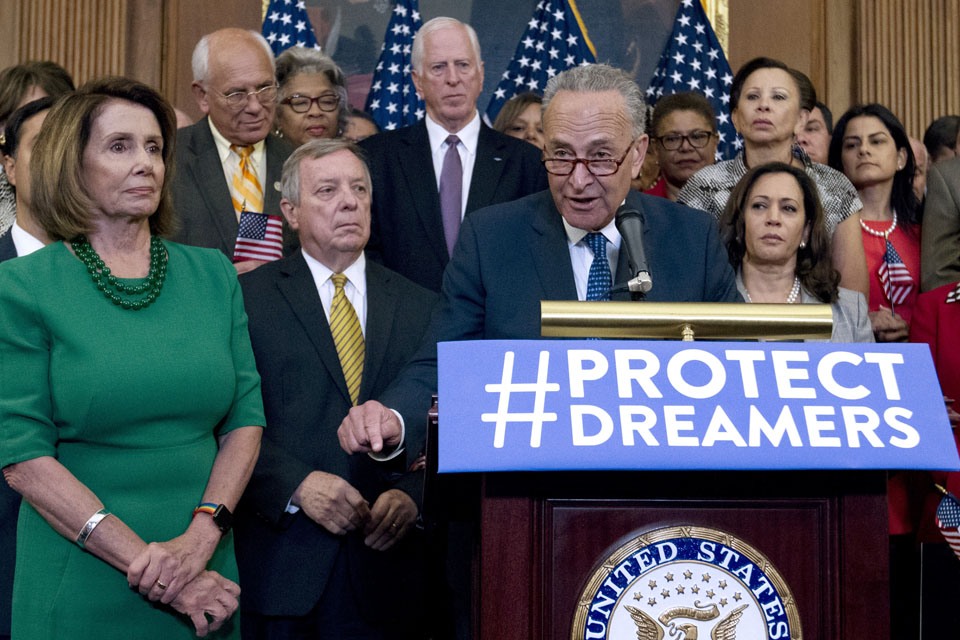Memo Published August 23, 2021 · 4 minute read
Yes, Immigration Reform Should Clear the Senate Parliamentarian
Nathan Kasai

For the first time in almost a decade, Congress has a tangible opportunity to pass long overdue immigration reforms. Through the budget reconciliation process, we can bring long term immigrant communities into the fold and provide them with a clear pathway to permanent legal status and later, earned citizenship.
And while some have questioned the chances of the immigration related provisions making it all the way through the Senate Parliamentarian’s “Byrd Rule,” immigration policy has been included by both parties before. Here’s where Congress has included immigration in the budget before.
Republicans Championed Immigration Reform in 2006 Reconciliation
The last time immigration-related reform was included in budget reconciliation, Republicans were in the driver’s seat. In 2006, Republicans controlled both the House and Senate. Within the original versions of the Deficit Reduction Act of 2005, Senate Republicans included several provisions directly related to immigration. First, they included language that recaptured unused employment-based visas, allowing up to 90,000 more visas to be issued annually. They also exempted spouses and minor children from the overall visa limits, thereby freeing up more total employment-based visas. The bill moreover levied $500 visa fees for certain employment based green cards and temporary guestworker visas. And finally, the bill allowed those who were eligible for a visa to adjust their immigrant status to a green card before the visa was actually available.
While these provisions were removed from the bill during conference with House version, they didn’t fail a Byrd rule determination. And importantly, they passed the point in the Senate when the Parliamentarian would be called upon to do so. Their inclusion shows clear agreement on both sides of the aisle that specific immigration policies are within the acceptable scope of the budget reconciliation process. Republicans were in the majority during the 2006 reconciliation process. The immigration proposals they put forth were serious policies designed to go all the way President W. Bush’s desk. They failed to make it there for political, not parliamentary reasons.
Today’s Proposals Overlap Significantly with 2006
The immigration reforms being proposed today are remarkably similar in substance to those once championed by Senate Republicans. Senate Democrats are eyeing narrow immigration provisions in the budget process. These would provide adjustments of immigration status to four key immigrant groups in the United States: Dreamers, Temporary Protected Status (TPS) recipients, agricultural workers, and essential workers. While the underlying immigrant groups may be different than those considered in 2006, the core tool in the current budget reconciliation package is the same: adjustment of immigration status and the granting of more permanent legal resident visas.
In 2006, Republicans included both these in their legislation. They proposed allowing immigrants to adjust their status before actually receiving green cards just as Democrats and immigrant communities have called upon Congress to allow certain undocumented immigrants to enter into a provisional legal immigrant status that later has a pathway to a green card. Moreover, because the Republican 2006 proposal would have exempted spouses and minor children of certain employment-based visas and recaptured unused visas, it would have been a significant increase in visas granted each year, in line with the scale of Democratic Senate proposals today. 15 years ago Republicans established that reconciliation is a proper avenue for bold immigration reforms.
Conclusion
Congress has a once in a generation opportunity to finally deliver upon the promises we have made to communities across the country. Not only is this the smart and right move for our entire country and economy, but it passes muster with policies proposed under reconciliation in the past. Republicans rightly once attempted immigration reform via reconciliation. Democrats are right to move forward with it now.
